 полная версия
полная версияThe Classic Myths in English Literature and in Art (2nd ed.) (1911)
35. The "Venus of Milo." Of artistic conceptions of Aphrodite, the most famous are the statues called the Venus of Melos and the Venus of the Medici.34 A comparison of the two conceptions is instituted in the following poem.35 The worshiper apostrophizes the Venus of Melos, that "inner beauty of the world," whose tranquil smile he finds more fair than "The Medicean's sly and servile grace":

VENUS OF MELOS
From our low world no gods have taken wing;Even now upon our hills the twain are wandering:36The Medicean's sly and servile grace,And the immortal beauty of thy face.One is the spirit of all short-lived loveAnd outward, earthly loveliness:The tremulous rosy morn is her mouth's smile,The sky, her laughing azure eyes above;And, waiting for caress.Lie bare the soft hill-slopes, the whileHer thrilling voice is heardIn song of wind and wave, and every flitting bird.Not plainly, never quite herself she shows:Just a swift glance of her illumined smileAlong the landscape goes;Just a soft hint of singing, to beguileA man from all his toil;Some vanished gleam of beckoning arm, to spoilA morning's task with longing, wild and vain.Then if across the parching plainHe seek her, she with passion burnsHis heart to fever, and he hearsThe west wind's mocking laughter when he turns,Shivering in mist of ocean's sullen tears.It is the Medicean: well I knowThe arts her ancient subtlety will show, —The stubble field she turns to ruddy gold;The empty distance she will foldIn purple gauze; the warm glow she has kissedAlong the chilling mist:Cheating and cheated love that grows to hateAnd ever deeper loathing, soon or late.Thou, too, O fairer spirit, walkest hereUpon the lifted hills:Wherever that still thought within the breastThe inner beauty of the world hath moved;In starlight that the dome of evening fills;On endless waters rounding to the west:For them who thro' that beauty's veil have lovedThe soul of all things beautiful the best.For lying broad awake, long ere the dawn,Staring against the dark, the blank of spaceOpens immeasurably, and thy faceWavers and glimmers there and is withdrawn.And many days, when all one's work is vain,And life goes stretching on, a waste gray plain,With even the short mirage of morning gone,No cool breath anywhere, no shadow nighWhere a weary man might lay him down and die,Lo! thou art there before me suddenly,With shade as if a summer cloud did pass,And spray of fountains whispering to the grass.Oh, save me from the haste and noise and heatThat spoil life's music sweet:And from that lesser Aphrodite there —Even now she standsClose as I turn, and O my soul, how fair!
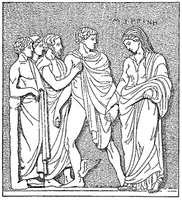
Fig. 20. Hermes Psychopompos
36. Mercury (Hermes), born in a cave of Mount Cyllene in Arcadia, was the son of Jupiter and Maia (the daughter of Atlas). According to conjecture, his name Hermes means the Hastener. Mercury, swift as the wind, was the servant and herald of Jupiter and the other gods. On his ankles (in plastic art), and his low-crowned, broad-brimmed petasus, or hat, were wings. As messenger of Heaven, he bore a wand (caduceus) of wood or of gold, twined with snakes and surmounted by wings, and possessed of magical powers over sleeping, waking, and dreams. He was beautiful and ever in the prime of youthful vigor. To a voice sweet-toned and powerful, he added the persuasiveness of eloquence. But his skill was not confined to speech; he was also the first of inventors – to him are ascribed the lyre and the flute. He was the forerunner, too, of mathematicians and astronomers. His agility and strength made him easily prince in athletic pursuits. His cunning rendered him a dangerous foe; he could well play the trickster and the thief, as Apollo found out to his vexation, and Argus, and many another unfortunate. His methods, however, were not always questionable; although the patron of gamblers and the god of chance, he, at the same time, was the furtherer of lawful industry and of commerce by land and sea. The gravest function of the Messenger was to conduct the souls of the dead, "that gibber like bats as they fare, down the dank ways, past the streams of Oceanus, past the gates of the sun and the land of dreams, to the mead of asphodel in the dark realm of Hades, where dwell the souls, the phantoms of men outworn."37
37. Vesta (Hestia), goddess of the hearth, public and private, was the first-born child of Cronus and Rhea and, accordingly, the elder sister of Jupiter, Juno, Neptune, Pluto, and Ceres. Vesta was an old maid by choice. Averse to Venus and all her ways, she scorned the flattering advances of both Neptune and Apollo, and resolved to remain single. Whereupon Jupiter gave her to sit in the middle of his palace, to receive in Olympus the choicest morsels of the feast, and, in the temples of the gods on earth, reverence as the oldest and worthiest of Olympian divinities. As goddess of the burning hearth, Vesta is the divinity of the home: of settled, in opposition to nomadic, habits of life. She was worshiped first of the gods at every feast. Before her shrine in city and state the holy flame was religiously cherished. From her altars those of the other gods obtained their fires. No new colony, no new home, was duly consecrated till on its central hearth there glowed coals from her ancestral hearth. In her temple at Rome a sacred fire, tended by six virgin priestesses called Vestals, was kept religiously aflame. As the safety of the city was held to be connected with its conservation, any negligence, by which it might go out, was severely punished. Whenever the fire did die, it was rekindled from the rays of the sun.
38. Of the Lesser Divinities of Heaven the most worthy of mention are:
1. Cupid (Eros), small but mighty god of love, the son of Venus and her constant companion. He was often represented with eyes covered because of the blindness of his actions. With his bow and arrows, he shot the darts of desire into the bosoms of gods and men. Another deity named Anteros, reputed the brother of Eros, was sometimes represented as the avenger of slighted love, and sometimes as the symbol of reciprocal affection. Venus was also attended at times by another brother of Eros, Himeros, or Longing, and by Hymen, a beautiful youth of divine descent, the personification of the wedding feast and leader of the nuptial chorus. Of Eros the poet Gosse writes:
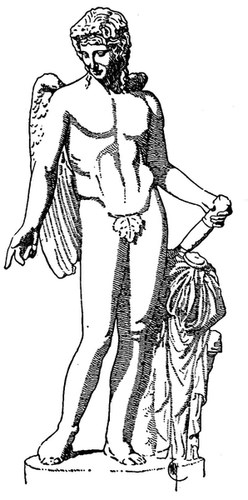
Fig. 21. Eros
Within a forest, as I strayedFar down a somber autumn glade,I found the god of love;His bow and arrows cast aside,His lovely arms extended wide,A depth of leaves above,Beneath o'erarching boughs he madeA place for sleep in russet shade.His lips, more red than any rose,Were like a flower that overflowsWith honey pure and sweet;And clustering round that holy mouth,The golden bees in eager drouthPlied busy wings and feet;They knew, what every lover knows,There's no such honey-bloom that blows.38
2. Hebe, daughter of Jupiter and Juno, goddess of youth and cupbearer to the gods. According to one story, she resigned that office on becoming the wife of Hercules. According to another, Hebe was dismissed from her position in consequence of a fall which she met with one day when in attendance on the gods. Her successor was Ganymede, a Trojan boy whom Jupiter, in the disguise of an eagle, seized and carried off from the midst of his playfellows on Mount Ida, bore up to Heaven, and installed in the vacant place.
3. The Graces, daughters of Jove by Eurynome, daughter of Oceanus. They were goddesses presiding over the banquet, the dance, all social pleasures, and polite accomplishments. They were three in number, – Euphrosyne, Aglaia, and Thalia. Spenser describes the office of the Graces thus:
These three on men all gracious gifts bestowWhich deck the body or adorn the mind,To make them lovely or well-favored show;As comely carriage, entertainment kind,Sweet semblance, friendly offices that bind,And all the complements of courtesy;They teach us how to each degree and kindWe should ourselves demean, to low, to high,To friends, to foes; which skill men call civility.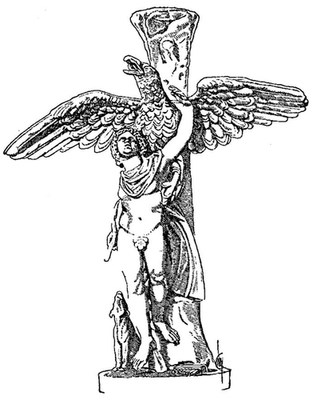
Fig. 22. Rape of Ganymede
4. The Muses, daughters of Jupiter and Mnemosyne (Memory). They presided over song and prompted the memory. They are ordinarily cited as nine in number; and to each of them was assigned patronage in some department of literature, art, or science. Calliope was the muse of epic poetry, Clio of history, Euterpe of lyric poetry, Melpomene of tragedy, Terpsichore of choral dance and song, Erato of love poetry, Polyhymnia of sacred poetry, Urania of astronomy, Thalia of comedy.
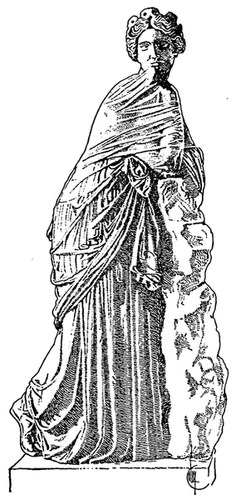
Fig. 23. Polyhymnia
5. Themis, one of the Titans, a daughter of Uranus. She sat, as goddess of justice, beside Jupiter on his throne. She was beloved of the father of gods and men, and bore him the Hours, goddesses who regulated the seasons, and the Fates.
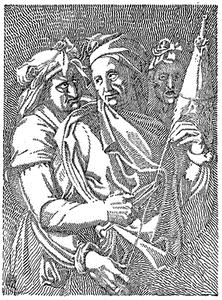
Fig. 24. The Three Fates
From the painting by Michelangelo(?)
6. The Fates, three in number, – Clotho, Lachesis, and Atropos. Their office was to spin the thread of human destiny, and they were provided with shears with which they cut it off when they pleased.39 According to Hesiod, they were daughters of Night.
7. Nemesis, daughter of Night. She represented the righteous anger and vengeance of the gods, particularly toward the proud, the insolent, and breakers of the law.
8. Æsculapius, son of Apollo. By his skill in medicine he restored the dead to life. Being killed by the lightning of Jove, he was translated to the ranks of Heaven. His function was the art of healing.
9. The Winds, – Boreas, or Aquilo, the north wind; Zephyrus, or Favonius, the west; Notus, or Auster, the south; and Eurus, the east. The first two, chiefly, have been celebrated by the poets, the former as the type of rudeness, the latter of gentleness. It is said that Boreas loved the nymph Orithyia and tried to play the lover's part, but met with poor success; for it was hard for him to breathe gently, and sighing was out of the question.
Weary at last of fruitless endeavors, he acted out his true character, seized the maiden and bore her off. Their children were Zetes and Calaïs, winged warriors, who accompanied the Argonautic expedition and did good service in an encounter with those monstrous birds, the Harpies. Zephyrus was the lover of Flora (Chloris).
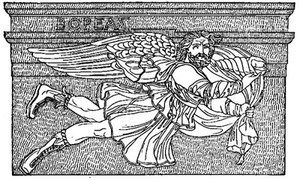
Fig. 25. Boreas
Here, too, may be mentioned Æolus, the king of the winds, although he is not a lesser divinity of Heaven. His palace was on the precipitous isle of Æolia, where, with his six sons and six daughters, he kept eternal carouse. The winds, which he confined in a cavern, he let loose as he saw fit or as he was bidden by superior deities. He is sometimes called Hippotades.40

Fig. 26. Zephyros
10. Helios, Selene, and Eos, children of the Titan Hyperion. Helios and Selene were the more ancient Greek divinities of Sun and Moon respectively. Helios, the charioteer of the sun, is, as has been already said, frequently identified with his successor, Apollo. The attributes and adventures of Selene were merged in those of the more modern Diana. Eos, or, in Latin nomenclature, Aurora, the rosy-fingered goddess of the Morn, was mother of the stars and of the morning and evening breezes. Saffron-robed she rises from the streams of Ocean, to bring light to gods and men.

Fig. 27. Boreas carrying off Orithyia
11. Phosphor, the morning-star, the star of Venus, son of Aurora and the hunter Cephalus. Hesper, the evening-star, was sometimes identified with Phosphor. He was king of the Western Land, and, say some, father of the Hesperides, who guarded the golden apples of the sunset.
The Spirit in Milton's Comus tells of
… the gardens fairOf Hesperus, and his daughters threeThat sing about the golden tree.Along the crispèd shades and bowersRevels the spruce and jocund Spring;The Graces and the rosy-bosomed HoursThither all their bounties bring.There eternal Summer dwells,And west winds with musky wingAbout the cedarn alleys flingNard and cassia's balmy smells.Iris there with humid bowWaters the odorous banks, that blowFlowers of more mingled hueThan her purfled scarf can shew.And Tennyson taking the lines as a text has written the melodious and mystic song of the Hesperides, beginning —
The golden apple, the golden apple, the hallowed fruit,Guard it well, guard it warily,Singing airily,Standing about the charmèd root.Round about all is mute,As the snowfield on the mountain-peaks,As the sandfield at the mountain-foot.Crocodiles in briny creeksSleep and stir not: all is mute.If ye sing not, if ye make false measure,We shall lose eternal pleasure,Worth eternal want of rest.Laugh not loudly: watch the treasureOf the wisdom of the West.Readers of this poem will notice that Tennyson follows the tradition by which a sleepless dragon is introduced among the guardians of the Hesperian fruit. Still other versions substitute for Hesperus, the Titan Atlas.
12. Various Other Personifications. The constellation Orion, whose story will be narrated; Victoria (Nike), the goddess of Victory; Discors (Eris), the goddess of Strife; and Iris, goddess of the rainbow, who is represented frequently as a messenger of the gods.
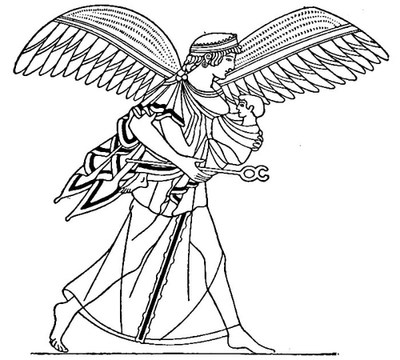
Fig. 28. Iris carrying Child
CHAPTER III
THE GODS OF EARTH 41
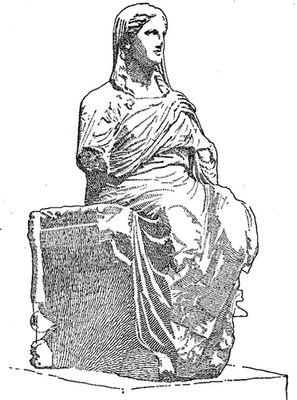
Fig. 29. Demeter of Knidos
39. Conception of the World. The Greek poets believed the earth to be flat and circular. In their opinion their own country occupied the middle of it, and the central point was either Mount Olympus, the abode of the gods, or Delphi, famous for its oracle. The circular disk of the earth was crossed from west to east and divided into two equal parts by the Sea, as they called the Mediterranean and its continuation the Euxine, the only seas with which they were acquainted. Around the earth flowed River Ocean, from south to north on the western side, in a contrary direction on the eastern. It flowed in a steady, equable current, unvexed by storm or tempest. The sea and all the rivers on earth received their waters from it.
The northern portion of the earth was inhabited by the Hyperboreans, dwelling in bliss and everlasting spring beyond the mountains whose caverns sent forth the piercing blasts of the north wind. Their country was inaccessible by land or sea. They lived exempt from disease or old age, from toils and warfare. "I come" sings one of them,42—
I come from a land in the sun-bright deep,Where golden gardens glow,Where the winds of the north, becalmed in sleep,Their conch-shells never blow.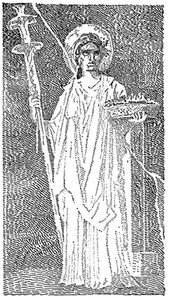
Fig. 30. Ceres
On the south side of the earth, close to the stream of Ocean, dwelt the Æthiopians, whom the gods held in such favor that they left at times the Olympian abodes to partake of the Æthiopian sacrifices and banquets. On the western margin of the earth, by the stream of Ocean, lay the Elysian Plain, where certain mortals enjoyed an immortality of bliss.
The Dawn, the Sun, and the Moon were supposed to rise out of Ocean on the eastern side and to drive through the air, giving light to gods and men. The stars, also, except those forming the Wain or Bear and others near them, rose out of and sank into the stream of Ocean. There the sun-god embarked in a winged boat, which conveyed him by the northern part of the earth back to his place of rising in the east.
40. Ceres (Demeter), the goddess of sowing and reaping, of harvest festivals, and of agriculture in general, was sister of Jupiter and daughter of Cronus and Rhea. She is connected through her daughter Proserpine, queen of Hades, with the holy ceremonies and rites of death and of the lower world. Of the institutions founded or favored by her the most important were the mysteries celebrated at Eleusis, concerning which we know that, in the presence of individuals initiated in the secret ritual and perhaps with their coöperation, scenes were enacted which represented the alternation of death and life in nature and, apparently, forecast the resurrection and immortality of man. Sacred to Ceres and to Proserpine were golden sheaves of corn and soporific poppies; while, among animals, cows, sheep, and pigs were acceptable to them.
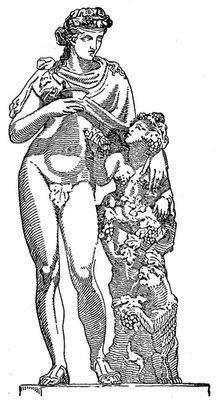
Fig. 31. Dionysus and the Vine
41. Gæa (Ge), the Mother Earth, wife of Uranus, belongs to the older order of gods; so also, another goddess of the earth, Rhea, the wife of Cronus and mother of Jupiter. In Phrygia, Rhea became identified with Cybele, whose worship, as mother of the gods, was at a later period introduced into Rome. The Greek mother, Rhea, was attended by the Curetes; the Phrygian mother by the Corybantes, who celebrated her orgies with enthusiastic din of trumpets, drums, and cymbals. Cybele presided over mountain fastnesses and fortified places.
42. Bacchus (Dionysus), the god of wine, was the son of Jupiter and Semele, daughter of Cadmus of Thebes. He was especially the god of animal life and vegetation. He represented not only the intoxicating power of wine but its social and beneficent influences, and was looked upon as a promoter of civilization, a lawgiver, and a lover of peace. His forehead was crowned with vine leaves or ivy. He rode upon the tiger, the panther, or the lynx, or was drawn by them in a car. His worshipers were Bacchanals, or Bacchantes. He was attended by Satyrs and Sileni and by women called Mænads, who, as they danced and sang, waved in the air the thyrsus, a staff entwined with ivy and surmounted by a pine cone. Ordinarily, as in the following verses by Dryden, the convivial qualities of the god overshadow all the rest:
The praise of Bacchus then the sweet musician sung,Of Bacchus ever fair, and ever young.The jolly god in triumph comes;Sound the trumpets, beat the drums;Flushed with a purple graceHe shows his honest face:Now give the hautboys breath; he comes, he comes.Bacchus, ever fair and young,Drinking joys did first ordain;Bacchus' blessings are a treasure,Drinking is the soldier's pleasure;Rich the treasure,Sweet the pleasure,Sweet is pleasure after pain.43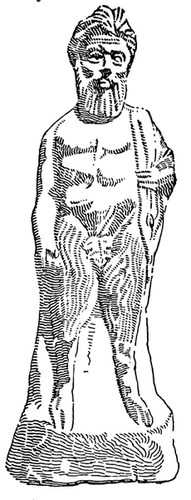
Fig. 32. Pan the Hunter
43. The Lesser Divinities of Earth were:
1. Pan, son of Mercury and a wood-nymph or Dryad. He was the god of woods and fields, of flocks and shepherds. He dwelt in caves, wandered on the mountains and in valleys, amused himself with the chase, led the dances of the Dryads, and made love to them. But his suit was frequently of no avail, for though good-natured he was not prepossessing; his hoofs and horns did not enhance his comeliness. He was fond of music and was himself inventor of the syrinx, or shepherd's pipe, which he played in a masterly manner. Like other gods who dwelt in forests, he was dreaded by those whose occupations caused them to pass through the woods by night; for gloom and loneliness oppress and appall the mind. Hence sudden unreasonable fright was ascribed to Pan and called a Panic terror.
2. The Nymphs. Pan's partners in the dance, the Dryads, were but one of several classes of nymphs. There were, beside them, the Oreads, nymphs of mountains and grottoes; and the Water-Nymphs, who are mentioned in later sections.
3. The Satyrs, deities of the woods and fields. In early art they appear as bearded creatures with snub noses, goats' ears, and horses' tails. Later they resemble youths, sometimes with sprouting horns. The goat-legged satyr is found in Roman poetry.
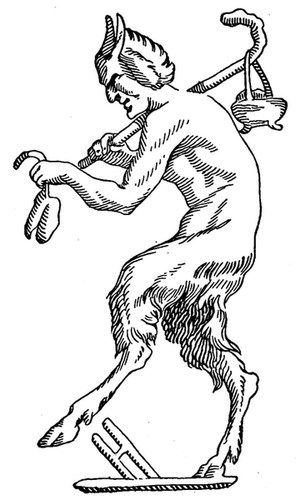
Fig. 33. A Satyr
CHAPTER IV
THE GODS OF THE UNDERWORLD 44
44. The Underworld was the region of darkness inhabited by the spirits of the dead and governed by Pluto (Hades) and Proserpina, his queen. According to the Iliad, this realm lay "beneath the secret places of the earth."45 And from the Odyssey we gather that it is not in the bowels of the earth, but on the under side at the limits of the known world, across the stream Oceanus, where is a waste shore, the land of the Cimmerians, shrouded in mist and cloud, never lighted by the sun "neither when he climbs up the starry heavens nor when again he turns earthward from the firmament."46 From that land one goes beside the stream till he reaches the dank house of Hades. The realm of darkness is bounded by awful rivers: the Styx, sacred even among the gods, for by it they sealed their oaths, and the Acheron, river of woe, – with its tributaries, Phlegethon, river of fire, and Cocytus, river of wailing. Hither past the White Rock, which perhaps symbolizes the bleaching skeletons of the dead, and past the gates of the sun, it is the duty of Hermes (Mercury) to conduct the outworn ghosts of mortals. One of the Greek dramatists, Sophocles, tells us that this shore of death is "down in the darkling west."47 In later poems we read that Charon, a grim boatman, received the dead at the River of Woe, and ferried them across, if the money requisite for their passage had been placed in their mouths and their bodies had been duly buried in the world above.48 Otherwise he left them gibbering on the hither bank. The abode of Pluto is represented as wide-gated and thronged with guests. At the gate Cerberus, a three-headed, serpent-tailed dog, lay on guard, – friendly to the spirits entering, but inimical to those who would depart. The palace itself is dark and gloomy, set in the midst of uncanny fields haunted by strange apparitions. The groves of somber trees about the palace, – the meads of Asphodel, barren or, at best, studded with futile bushes and pale-flowered weeds, where wander the shades, – and the woods along the waste shore "of tall poplars and willows that shed their fruit before the season" are, without any particular discrimination, celebrated by the poets as the Garden of Proserpine.
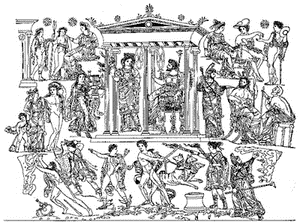
Fig. 34. The Greek Underworld
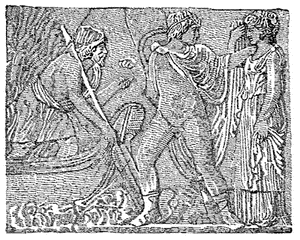
Fig. 35. Hermes conducting a Soul to Charon
Here life has death for neighbor,And far from eye or earWan waves and wet winds labor,Weak ships and spirits steer;They drive adrift, and whitherThey wot not who make thither;But no such winds blow hither,And no such things grow here.No growth of moor or coppice,No heather-flower or vine,But bloomless buds of poppies,Green grapes of Proserpine,Pale beds of blowing rushes,Where no leaf blooms or blushesSave this whereout she crushesFor dead men deadly wine. * * * * *Pale, beyond porch and portal,Crowned with calm leaves, she standsWho gathers all things mortalWith cold immortal hands;Her languid lips are sweeterThan love's, who fears to greet her,To men that mix and meet herFrom many times and lands.
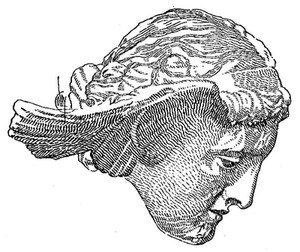
Fig. 36. Hypnos


